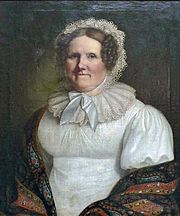Anna Catharina Elisabeth Heinicke
Anna Catharina Elisabeth Heinicke , b. Kludt , used Morin (born November 9, 1757 in Jüthorn near Wandsbek ; † August 6, 1840 in Leipzig ) was a German deaf educator and long-time director of the deaf-mute institute in Leipzig.
Life
Anna Catharina Elisabeth Kludt was the daughter of the worker Simon Kludt and his wife Sophia Elisabeth Hendel. She had married (Morin) at the age of 18, but had already become a widow in 1776. She had two brothers who were deaf and dumb who were tutored by the deaf and dumb teacher Samuel Heinicke . His wife died in 1775 after a 21-year marriage. Heinicke wooed about the 30 years younger widow, and they married in Hamburg in 1778 .
In the same year they moved to Leipzig with their four children from their first marriage and nine pupils , where Heinicke opened the “Chursächsisches Institut for the dumb and other people with language disabilities” as the first state school for the deaf in Germany. Although from 1782 it was legally subordinate to the University of Leipzig , the school was operated in rented apartments for the first few years. Heinicke's wife took care of the large household and, through her brothers used to dealing with the deaf and mute, instructed the students in handicrafts and the like. Over time, she adopted her husband's teaching methods.
The family expanded with the birth of the children Wilhelmine Rosina (1778), Amalie Regina (1783) and Samuel Anton (1788). Samuel Heinicke died in 1790 and left the family unsupervised. His widow confidently applied in several letters to the Elector Friedrich August III. to the management of the school. This was finally transferred to her together with the assistant teacher August Friedrich Petschke (1759-1822) in October 1790. After she had refused Petschke's proposal to marry, there were problems with the cooperation, and in 1792 the elector appointed Petschke as the first teacher and she as the sole director.
She was the first director of a deaf school in Germany for 38 years. In 1810, in order to improve the path of the deaf into professional life, she achieved that teachers who trained deaf people were paid a bonus of 50 thalers. Before the Battle of the Nations in Leipzig , she secured the school's existence by moving from the suburb to the city center. In 1818, she introduced a Sunday school at her home that offered education to deaf adults as well as social gatherings. In 1821, thanks to a foundation from the widow Luise Carl (1762–1815), Ms. Heinicke was able to acquire the school's first building for 38 pupils.
In 1828, the year of the 50th anniversary of the school and its 50th anniversary of service, the 71-year-old applied for her pension and recommended the teacher Carl Gottlob Reich (1782-1852), who had been employed at the institute since 1810 and joined her since 1816 , as her successor her daughter Amalie Regina was married. She herself stayed at the school and in 1839, a year before her death, was able to see the laying of the foundation stone for a new urban school building.
Web links
- Anna Catharina Elisabeth Heinicke, b. Kludt. In: Website Leipzig - Biographies of historical women personalities: Education. Retrieved June 14, 2016 .
- Gerlinde Renzelberg: Anna Catharina Elisabeth Heinicke. In: The development in Germany. Retrieved June 14, 2016 .
Individual evidence
- ↑ Erwin Kern: Heinicke, Samuel. In: New German Biography (NDB). Volume 8, Duncker & Humblot, Berlin 1969, ISBN 3-428-00189-3 , p. 303 f. ( Digitized version ).
| personal data | |
|---|---|
| SURNAME | Heinicke, Anna Catharina Elisabeth |
| ALTERNATIVE NAMES | Kludt, Anna Catharina Elisabeth (maiden name); Morin, Anna Catharina Elisabeth |
| BRIEF DESCRIPTION | German deaf educator |
| DATE OF BIRTH | November 9, 1757 |
| PLACE OF BIRTH | Jüthorn near Wandsbek |
| DATE OF DEATH | August 6, 1840 |
| Place of death | Leipzig |
